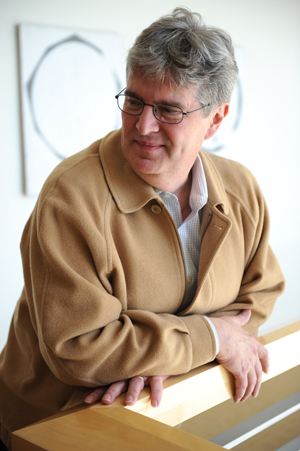Meet and greet
Ronald Burt, PhD'77, reexamines what it means to be a good networker.
By Laura Putre
Photography by Dan Dry

The true benefits of networking, says Ronald Burt, come from greater emotional intelligence.
If you've ever been to a networking cocktail hour, you know the drill: schmooze and amass names and numbers of friends of friends who, if you're lucky, might one day lend you a hand up the corporate ladder. Perhaps they'll pass along a job lead or tip about an emerging market. But according to Chicago Booth professor Ronald Burt, PhD'77, gathering more information from contacts isn't the true career benefit of networking; personal growth is.
"Individuals make a lot of their own network advantage," writes Burt in his 2010 book Neighbor Networks: Competitive Advantage Local and Personal (Oxford University Press). When individuals are exposed to diverse types of people, he explains, they learn to be a bridge between those with diverging opinions. In the process, they become more capable in their field, able to spot opportunities and new ways of thinking that more isolated colleagues miss.
A corporate-sociology specialist who has been studying networks for the past 25 years, Burt is rethinking the how behind networking. Neighbor Networks is his most recent exploration of whether managers with a broader range of contacts have a better chance of being promoted and earning raises than those with a small, more insular circle of colleagues. (He defines "broad" as connections to groups that one would not often or easily associate with, be they from different cultures, geographies, industries, or other sectors.)
Gathering personnel data on a cross-section of managers in regional and global firms-a large software company, a commercial bank, and a defense contractor were all part of the sample-he expected results to vary depending on the type of organization. Burt figured investment bankers in an international firm, for example, would benefit from far-reaching contacts because markets in different countries affect each other. A trader in, say, New York, could actually make use of information from a Singaporean contact. On the other hand, he guessed that workers in a regional supply-chain would not benefit from connections across cultures and industries since their operations were fairly self-contained.
In both cases, however, Burt found that the more far-reaching the network, the more successful the manager. It didn't matter whether a manager's contacts themselves were well-connected or not. He concluded that simply having a large number of quality contacts who could share information didn't make a difference in a businessperson's success or failure. Instead it was the social skills subjects learned relating to a diverse cross-section of people that produced a distinct professional advantage.
"When you hang out with quite varied people, you develop the skill of communicating between people who don't understand one another," says Burt. "It could be described as emotional intelligence-of dealing with people who have difficulty dealing with one another." Leaders who can do this are better able to seek out and pitch ideas across departments and industries, because they can anticipate concerns outsiders might have and find a common language between different parties.
Lately, Burt has been applying this knowledge in his private-sector consulting. "I'm working with a very large British bank right now," he says. "Their problem is they're so big, individuals can run what would otherwise be a large company and not ever get outside what they've always done. You can have an accountant who participates in a particular kind of financial activity that can involve billions of dollars, but that person doesn't know anything outside their own specialty. So the bank now has too many idiot savants, which means they don't have any leaders for the organization." The key, he says, is for managers to be given a wider variety of tasks, forcing them to adapt to new circumstances and work with people who aren't like them.
The first person in his family to become an academic rather than a minister, Burt used to marvel at the way his maternal grandmother found common ground among people from all walks of life in their Quaker congregation in Boston. Seeing his grandmother in action gave Burt an appreciation not for the individual "who has an idea of how should we raise money to fix the lightning strike of the steeple, but the one who knows the room, who can talk about how Susan's family knows a lot of the downtown commercial real-estate people and how Sam, who's been with us for what seems like forever, knows the financial community up on Wall Street." Such a person can broker connections and "pitch ideas to reach a much broader constituency."
He pauses, then comes back to the book: "Maybe this whole thing is trying to account for my grandmother's success." In her world, success involved building meaningful relationships. "We're social creatures," says Burt, "and a lot of who each of us is depends on how we're engaging our neighbors."
Return to top
